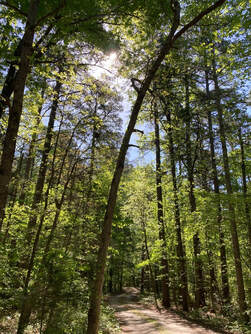 Southern Conservation Partners is honored to partner with Earthseed Land Collective in Durham, North Carolina and to have served as their 501(c )(3) fiscal sponsor since 2019. Zulayka Santiago in 2023 authored and published a wonderful collection of her essays, meditations, poems, photos, and perspectives on life and nature that focuses on her experiences and observations gained while in residence on Earthseed’s 48-acres of woodlands, meadows, and gardens in north Durham. Zulayka is one of seven founding members of the collective and co-steward of its property purchased in 2016. Triangle Land Conservancy holds a permanent conservation easement over nearly 30-acres of the land, primarily consisting of the forested portion and its streams. In our view, Zulayka’s writing is masterful, inspirational, and lovely. We highly recommend her book, Outside I Breathe Freely, for your reading and reflection.* Following are excerpts that may give you a taste of her sumptuous compositions. <click "Read More," below right >
0 Comments
Challenges and Dilemmas in Protecting Natural and Cultural Environments in the Twenty-first Century12/10/2015
 Photo by Laura Cotterman Photo by Laura Cotterman We need a convergence of interests and efforts if we want to be successful in protecting land, water, wildlife, and historic and cultural resources. Every protected natural place also preserves an historic site, because no natural area is so remote or so wild as not to retain vestiges of human presence. In this Anthropocene era there are effectively no “natural areas” in the United States that lack signs of human culture—that are without human imprint. Understanding this fact (and learning to read the cultural history of a “natural” landscape) raises hope and opportunity for more effectively combining forces to conserve and protect areas possessing both natural and cultural resources and legacies. National Heritage Areas are relatively recent examples of collaborative recognition encompassing the conservation of natural and cultural resources. In this time of profound and prolific human effects, special dilemmas and challenges arise as we work to preserve nature. There is debate over the value of protecting smaller scale natural areas versus focusing on broad landscapes. Nature is dynamic and the effects of human activities are so pervasive; no tract of land can be completely protected from human interference, history, and the flow of time. Land conservation programs must recognize and respond to the realities and challenges of influencing land use and guiding the conservation and protection of critically important environmental resources. Land conservationists, like historic preservationists, must move beyond the comparatively “safe” and non-confrontational strategies of simply buying key natural or historic places. We must make major advances and devise creative strategies to conserve whole landscapes with assets of natural and cultural importance—places held dear for both our natural and cultural heritage. Success in protecting the best of our natural and human environment can only be derived by fostering a sense of love and respect for the land. Out of a greater sense of love and respect for land as “home” will come greater public support for the work of land conservation and cultural resource protection. --by Chuck Roe, President, SCP Read more of Chuck’s perspective on this subject in his chapter “The Natural Environment,” published in the book A Richer Heritage: Preservation in the Twenty-First Century, Robert E. Stipe editor, University of North Carolina Press (2003). Download a PDF. In the chapter, Roe recounts the growth of concern about natural environments and increase in number of public and nongovernmental land conservation organizations in the U.S. since the late 1960s, the evolving methods employed by private land conservancies, private land conservation accomplishments over the thirty-year period and prospects for the future, the overlap of natural and cultural resource preservation efforts producing common ground of interests and opportunity, special dilemmas in preserving nature, and challenges for land conservation and nature preservation in the 21st century. |
When we see land as a community to which we belong, we may begin to use it with love and respect.... Conservation, viewed in its entirety, is the slow and laborious unfolding of a new relationship between people and land." There is in fact no distinction between the fate of the land and the fate of the people. When one is abused, the other suffers. From the PresidentSCP President Chuck Roe looked at land conservation along the route of John Muir's "Southern Trek." About ViewpointThis blog offers views of our Board and partners. We invite your viewpoint on the following questions: Archives
April 2024
Categories
All
|

 RSS Feed
RSS Feed